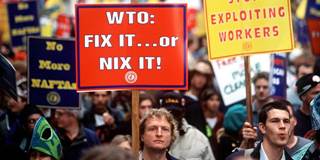Global governance requires rules, because flexibility and goodwill alone cannot tackle the hardest shared problems. With multilateralism under attack, the narrow path ahead is to determine, on a case-by-case basis, the minimum requirements of effective collective action, and to forge agreement on reforms that fulfill these conditions.
FLORENCE – Rewind to the late 1990s. After an eight-decade-long hiatus, the global economy was being reunified. Economic openness was the order of the day. Finance was being liberalized. The nascent Internet would soon give everyone on the planet equal access to information. To manage ever-growing interdependence, new international institutions were developed. The World Trade Organization was brought to life. A binding climate agreement, the Kyoto Protocol, had just been finalized.

FLORENCE – Rewind to the late 1990s. After an eight-decade-long hiatus, the global economy was being reunified. Economic openness was the order of the day. Finance was being liberalized. The nascent Internet would soon give everyone on the planet equal access to information. To manage ever-growing interdependence, new international institutions were developed. The World Trade Organization was brought to life. A binding climate agreement, the Kyoto Protocol, had just been finalized.